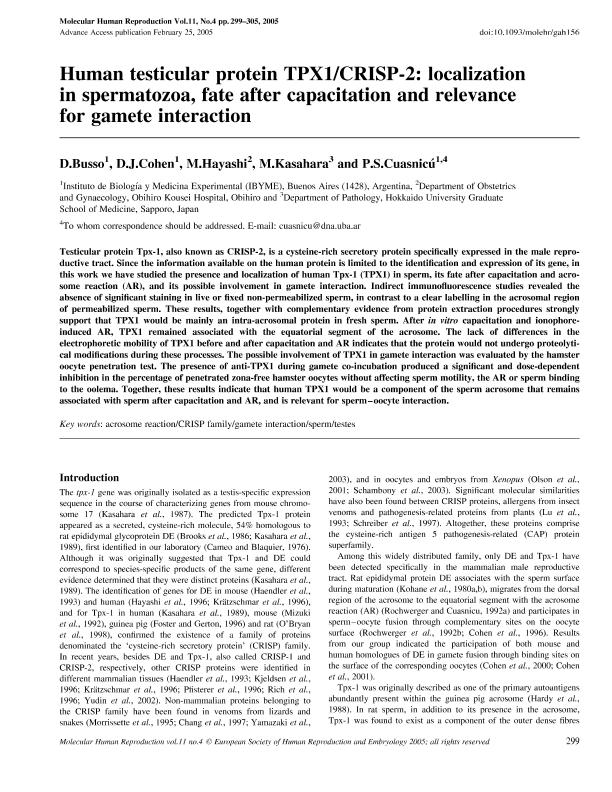Mostrar el registro sencillo del ítem
dc.contributor.author
Busso, Dolores
dc.contributor.author
Cohen, Debora Juana

dc.contributor.author
Hayashi, M.
dc.contributor.author
Kasahara, M.
dc.contributor.author
Cuasnicu, Patricia Sara

dc.date.available
2017-12-23T19:36:43Z
dc.date.issued
2005
dc.identifier.citation
Busso, Dolores; Cohen, Debora Juana; Hayashi, M.; Kasahara, M.; Cuasnicu, Patricia Sara; Human testicular protein TPX-1/CRISP-2: localization in spermatozoa, fate after capacitation and relevance for gamete interaction; Oxford University Press; Molecular Human Reproduction; 11; 4; 2005; 299-305
dc.identifier.issn
1360-9947
dc.identifier.uri
http://hdl.handle.net/11336/31466
dc.description.abstract
Testicular protein Tpx-1, also known as CRISP-2, is a cysteine-rich secretory protein specifically expressed in the male reproductive tract. Since the information available on the human protein is limited to the identification and expression of its gene, in this work we have studied the presence and localization of human Tpx-1 (TPX1) in sperm, its fate after capacitation and acrosome reaction (AR), and its possible involvement in gamete interaction. Indirect immunofluorescence studies revealed the absence of significant staining in live or fixed non-permeabilized sperm, in contrast to a clear labelling in the acrosomal region of permeabilized sperm. These results, together with complementary evidence from protein extraction procedures strongly support that TPX1 would be mainly an intra-acrosomal protein in fresh sperm. After in vitro capacitation and ionophore-induced AR, TPX1 remained associated with the equatorial segment of the acrosome. The lack of differences in the electrophoretic mobility of TPX1 before and after capacitation and AR indicates that the protein would not undergo proteolytical modifications during these processes. The possible involvement of TPX1 in gamete interaction was evaluated by the hamster oocyte penetration test. The presence of anti-TPX1 during gamete co-incubation produced a significant and dose-dependent inhibition in the percentage of penetrated zona-free hamster oocytes without affecting sperm motility, the AR or sperm binding to the oolema. Together, these results indicate that human TPX1 would be a component of the sperm acrosome that remains associated with sperm after capacitation and AR, and is relevant for sperm-oocyte interaction.
dc.format
application/pdf
dc.language.iso
eng
dc.publisher
Oxford University Press

dc.rights
info:eu-repo/semantics/openAccess
dc.rights.uri
https://creativecommons.org/licenses/by-nc-sa/2.5/ar/
dc.subject
Sperm
dc.subject
Egg
dc.subject
Fertilization
dc.subject.classification
Biología Reproductiva

dc.subject.classification
Ciencias Biológicas

dc.subject.classification
CIENCIAS NATURALES Y EXACTAS

dc.title
Human testicular protein TPX-1/CRISP-2: localization in spermatozoa, fate after capacitation and relevance for gamete interaction
dc.type
info:eu-repo/semantics/article
dc.type
info:ar-repo/semantics/artículo
dc.type
info:eu-repo/semantics/publishedVersion
dc.date.updated
2017-12-19T18:37:03Z
dc.identifier.eissn
1460-2407
dc.journal.volume
11
dc.journal.number
4
dc.journal.pagination
299-305
dc.journal.pais
Reino Unido

dc.journal.ciudad
Oxford
dc.description.fil
Fil: Busso, Dolores. Consejo Nacional de Investigaciones Científicas y Técnicas. Instituto de Biología y Medicina Experimental. Fundación de Instituto de Biología y Medicina Experimental. Instituto de Biología y Medicina Experimental; Argentina
dc.description.fil
Fil: Cohen, Debora Juana. Consejo Nacional de Investigaciones Científicas y Técnicas. Instituto de Biología y Medicina Experimental. Fundación de Instituto de Biología y Medicina Experimental. Instituto de Biología y Medicina Experimental; Argentina
dc.description.fil
Fil: Hayashi, M.. Hokkaido University Graduate School Of Medicine; Japón
dc.description.fil
Fil: Kasahara, M.. Hokkaido University Graduate School Of Medicine; Japón
dc.description.fil
Fil: Cuasnicu, Patricia Sara. Consejo Nacional de Investigaciones Científicas y Técnicas. Instituto de Biología y Medicina Experimental. Fundación de Instituto de Biología y Medicina Experimental. Instituto de Biología y Medicina Experimental; Argentina
dc.journal.title
Molecular Human Reproduction

dc.relation.alternativeid
info:eu-repo/semantics/altIdentifier/url/https://academic.oup.com/molehr/article/11/4/299/1080163
dc.relation.alternativeid
info:eu-repo/semantics/altIdentifier/doi/http://dx.doi.org/10.1093/molehr/gah156
dc.relation.alternativeid
info:eu-repo/semantics/altIdentifier/pmid/15734896
dc.relation.alternativeid
info:eu-repo/semantics/altIdentifier/url/http://sfx.metabib.ch/sfx_locater?sid=Entrez:PubMed&id=pmid:15734896
Archivos asociados
